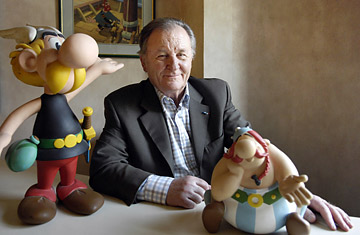
Albert Uderzo, French author and illustrator who launched the Asterix comics strip character in 1959 with author Rene Goscinny, posing with the statues of his characters Asterix and Obelix
Fans of the feisty Gallic comic character Asterix have always loved the monumental brawls their hero regularly finds himself in. Few, however, are taking pleasure in the latest Asterix fight — an ugly donnybrook between the comic's illustrator Albert Uderzo and his daughter Sylvie over her accusation that Uderzo was sweet-talked into selling his beloved creation to crass business interests. Now father and daughter are locked in battle over the future of the diminutive Gaul — and the $15 million or so he generates every year.
The dust-up began on Jan. 14 when Sylvie Uderzo published an open letter in French daily Le Monde, denouncing her father's decision to cede 60% of the Asterix series' parent company to publishing giant Hachette Livre. That sale was finalized earlier this month by Albert Uderzo and Anne Goscinny, whose father René was co-creator and writer of Asterix from the comic's inception in 1961 until his death in 1977. Since then Uderzo has continued producing the series on his own via the Editions Albert-René publishing company he founded in 1979 — a go-it-alone decision aimed at safeguarding the creativity and independence Asterix himself is famous for. (See pictures of some of the greatest ever animated movies.)
The decision to sell evidently infuriated Sylvie Uderzo, who until recently was the director general of Editions Albert-René, and still owns the remaining 40% stake in it. "Today, I'm rebelling (because) Asterix is my paper brother," began her letter to Le Monde. "[Now] I find myself entering into battle against perhaps Asterix's worst enemies: the men of industry and finance."
Sylvie didn't stop slugging there — and resorted to verbal uppercuts so potent readers might have suspected they were fueled by Getafix's trusty magic potion. (He's called Panoramix in the original French version.) Uderzo fille said she felt compelled to counter "this first victorious act of the invader against the indomitable Gauls" because of her father's "repudiation of all the values" Asterix stands for — "independence, fraternity, conviviality and resistance". Sylvie, then alleged her 81-year-old father had been convinced by unidentified advisers to reverse his fiercely independent, family control of the series, and sell it to outside business interests. For its part, Hachette Livre has made it clear in press reports that it views its acquisition of the 60% Asterix stake as a legitimate, above-board transaction with Albert Uderzo and Anne Goscinny; it meanwhile refused to comment on what it considers a private family dispute.
In comments to French wire service Agence France Presse on Jan. 26, Uderzo père used all the wit and cunning of his animated creation animated creation to counter suggestions he was an aging pigeon who'd been manipulated by business sharks. "To be accused by my own daughter, in the pages of the newspaper of reference, of being an old man, manipulated and deluded in his insatiable greed by the gnomes of finance, is already quite undignified," Uderzo said, before noting the irony of his daughter using language and imagery from the series to accuse its creator of selling out. "The accusation made against me is not only inspired by the appetite for power, it also aims to insult Asterix readers by confusing my abilities as an author with that of a publishing house shareholder."
Money and power are central to the row: Asterix comics sell roughly three million copies annually — more than 325 million have sold since the 1961 pilot — and generate sales of $14.8 million each year. Asterix has also inspired movie adaptations, collectible toys, and even a Paris-area theme park over the years.
But beyond the bottom line, the internecine brouhaha is also a fight over the best way to protect a beloved character who has attained cultural icon status in France — not least because Asterix endearingly personifies countless French traits that test outsiders' patience. What's at stake is the very appeal of the brainy but diminutive Asterix, super-sized Obélix, and canine chum Dogmatix (Idéfix in the original French).
Sylvie Uderzo insists her father stick by his earlier pledges that the Asterix series end upon his death. Albert Uderzo says he now trusts Hachette Livre to do right by Asterix — and both current and future fans. "I recall the letters I got after the death of René Goscinny," Uderzo explained this week. "Readers told me that it couldn't end there, which is why I had to continue the adventure."
